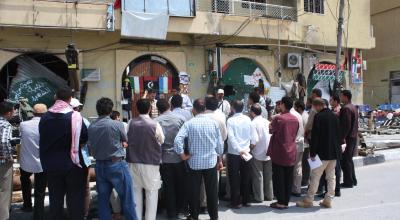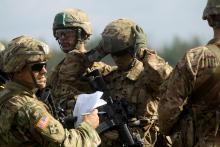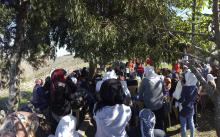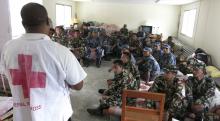Case prepared by Matthew Brown and Yildiz Miller, LL.M. students at Leiden University under the supervision of Professor Robert Heinsch as well as Sofia Poulopoulou and Christine Tremblay, PhD researchers, Kalshoven-Gieskes Forum, Leiden University; with the contribution of Jemma Arman and Isabelle Gallino, LL.M. students at the Geneva Academy.
A. OPERATIONALISING THE LAW OF ARMED CONFLICT FOR DISSIDENT FORCES IN LIBYA
As the conflict in Libya appears to be drawing to a close, more allegations are surfacing that war crimes have been committed, and fears have been expressed that reprisals may occur. [...] These allegations are at odds with the declared policy of the Libyan National Transitional Council (NTC) which, on March 24 stated, in relation to the treatment of detainees and prisoners, that “its policies strictly adhere to the ‘Geneva Convention relative to the Treatment of Prisoners of War’ as well as with the ethical and moral values of the Libyan society”. This statement continued:
“1. Any Libyan caught whether they be military personnel or citizens recruited to cause sabotage and spread chaos, should not be titled as ‘Prisoner’ but as a Libyan brother (or sister) who has been deceived.
2. All prisoners and detainees will be provided with food, water and necessary medical assistance and will be treated humanely, without the use of aggression in any form. The NTC will vow to punish those who violate this code and will allow local and international human rights organizations to freely visit and talk to the detainees and prisoners at any time.”’
Further, on May 19 the NTC launched a frontline manual on the fundamental rules of armed conflict [...]. This has been distributed in various forms, including sending extracts as text messages on mobile phones. This manual was intended to demonstrate its commitment to do its best to ensure that its forces would adhere to the principles of international humanitarian law, and thus minimize harm to the Libyan people. In its press release no.21 (which is not on its website), the NTC stated:
“We recognise that many of those men and women who have taken up arms in opposition to the Qadhafi regime are not combatants who have been formerly trained in the laws of armed conflict. As such, these guidelines were requested in order to help instruct them, as rapidly as possible, in the fundamental rules which they must respect, in particular those relating to the humane treatment of detainees and to targeting in an armed conflict.”’
[...]
As the group organising Libyan dissident forces, the NTC did not want to “act like Qadhafi and his forces”, it asked [Lawyers for Justice in Libya] to advise on the applicable rules of the law of armed conflict. [...] We were asked to focus on two areas: guidelines for the detention of captured Qadhafi forces, and guidelines on targeting. [...]
This proved to be a challenging task. The guidelines were for the use of untrained fighters who have received no prior instruction in the law of armed conflict. They had to be easily understandable. They were drafted in English, but we were aware they would ultimately be translated into Arabic. [...] An analogous consideration was that the guidelines should try to be sensitive to cultural and religious sensibilities.
[...] [T]he applicable law should be that [sic] found in common Article 3 of the Geneva Conventions and Additional Protocol II. While these provide basic protections for those not taking part in hostilities, including fighters placed hors de combat, for the wounded and sick, for medical units, and for detainees, the conventional rules on matters such as targeting and detention in a non-international armed conflict are, at best, rudimentary. We thought that these were inadequate and decided that it was necessary to augment the conventional rules by having recourse to customary law, but also to apply by analogy some conventional rules which would formally only be applicable in an international armed conflict. In short, we thought it necessary to suggest some standards which were in excess of those which need lawfully be applied, such as notifying the ICRC of the identity, location, and release of detainees.
The ability of both parties to detain during a non-international armed conflict is simply assumed by both common Article 3 and Additional Protocol II, inasmuch as both mandate protection for “persons deprived of their liberty for reasons related to the armed conflict” (APII, Article 5.1), but no legal basis is given for dissident forces to do so. There is also a practical gap in the conventional law. During an international armed conflict, the Third Geneva Convention provides that prisoners of war should be logged by capture cards (see Article 70). Prisoner of war status is not applicable during a non-international armed conflict, and there is no similar conventional procedure to keep track of detainees, but
ICRC customary rule 123 provides “The personal details of persons deprived of their liberty must be recorded”. We thought it practical to indicate that a method similar to the capture card should be used by the dissident forces in order that they had a record of who they had detained, and where. If implemented, we thought that this might also be a safeguard against allegations of enforced disappearances.
In trying to tailor the basic rules for the specific conflict, we tried to account for local cultural and religious sensibilities. For example, we were told that, under the Qadhafi regime, people expected to be beaten up as a matter of course on arrest. The guidelines emphasise that this must not happen to detained pro–Qadhafi fighters, or any other detainees for that matter. A tricky problem was to try to explain economically the prohibition on reprisals and collective punishments without descending into legalese. The solution adopted was to use the word “revenge” which, we were assured, on translation into Arabic would capture the essentials of the legal notion of reprisals.
The guidelines are perhaps over-determinative as they leave little room for the use of discretion in their application. This was inescapable given the conditions in which they are intended to be used. The untrained fighter in the field, we thought, needed clear and relatively unequivocal guidance. This was done using two formats: a flowchart to provide clarity in deciding whether someone should be detained; and a set of fairly simple propositions to govern matters such as the treatment of the dead, the wounded and the sick, conditions of detention, and basic rules on targeting.
[...] The law has become increasingly codified and much more complicated since Lieber’s day, but the problem of how to train a hurriedly assembled force of untrained men is as acute in the current conflict in Libya as it was in that earlier one.
One may hope that the implementation of these guidelines has lessened suffering during the conflict in Libya, and perhaps indicate a new and welcome trend in the conduct of contemporary non-international armed conflicts. It must be recalled that the NTC itself decided that it needed legal guidance and requested that the guidelines be drawn up.
B. WHAT THE LIBYAN REBELS NEED TO DO NOW THAT THEY’RE IN CHARGE
[…]
To date, the National Transitional Council in Libya has defied conventional expectations about how a rebel movement should behave. It has broadcast non-stop radio and TV messages explaining to its supporters the provisions of the Geneva Conventions, and recently sent a mass text message to its supporters reading: “Remember when you capture anyone from Qaddafi, that he is a Libyan like you. His dignity is your dignity, because we are both Libyan, and his family is your family, and his honor is your honor.” The NTC leader, Mustafa Abdel Jalil, declared last week, “[…] I call on all Libyans to act with responsibility and not to take justice into their own hands … treating prisoners of war well and kindly. We all have a right to live with dignity in this nation.”’ […]
N.B.: Materials published by the NTC are no longer available online. Therefore, the present case-study refers to them through secondary sources only.
Discussion
I. Classification of the Situation and Applicable Law
1. How would you classify the situation in Libya in 2011? What additional information would you require to make such a determination? What is the applicable law? Would Additional Protocol II be applicable to the situation? Why? (
GC I-IV, Art. 3;
P II, Art. 1)
2. Did the involvement of France, the United Kingdom and the United States internationalise the conflict? Did the NTC’s consent to the military intervention matter for classification?
3. How can IHL of international armed conflicts be made applicable in non-international armed conflicts?
4. What are the risks and advantages of applying IHL of international armed conflicts in non-international armed conflicts?
II. IHL Dissemination
5. Does the State’s obligation to respect and ensure respect for IHL extend to ensuring respect by non-state armed groups? Does this obligation continue in times of armed conflict between the State and these groups? (
GC I-IV, Art 1;
CIHL, Rule 144)
6. Do non-state armed groups have an obligation to disseminate IHL? To whom? Only when they become a party to the conflict? (
CIHL, Rule 142;
P II, Art. 19).
7. Could the State of Libya ever become responsible for the acts of non-state armed groups participating in an insurrection movement? What if the insurrection movement was successful? (
Articles on State Responsibility, Art. 10).
III. Elements Contributing to Respect for IHL
8. What might have encouraged the NTC to issue public statements and messages to armed groups encouraging compliance with IHL and the application of humanitarian principles? Do you think that being seen to be different from the previous regime was a supporting factor? How important do you think international recognition and/or support was to NTC at that time? Why? How do you think the public messages were perceived by the international community?
9. Do you think that IHL dissemination is becoming easier with technological developments? Quicker? More effective? How can mobile phones be used to encourage IHL compliance? Are there any disadvantages of sharing information in this way? How could these risks be mitigated?
10. How might the development of a military manual need to be tailored to the particular circumstances of each armed group? Language and translation issues? Cultural and/or religious considerations? The level of prior training? How might previous non-compliance with IHL by other actors contribute to a misunderstanding of the law?
11. What advantage did the author see in setting out rules that were more detailed, thus limiting the discretion of “the untrained fighter in the field”? Do you agree with this?
12. Do you think that rules made applicable through analogies with the law of international armed conflicts can easily be respected by armed groups? Would you extend the application of the rules mentioned here as analogies to all non-international armed conflicts?
13. (Document A) The author suggests that the law applicable in NIAC is too rudimentary and needs to be augmented, including through analogies with the law of IAC. Do you agree that the law of NIAC needs to be developed? Why do you think this has not yet been the case? In your opinion, which areas of the law would merit development?






